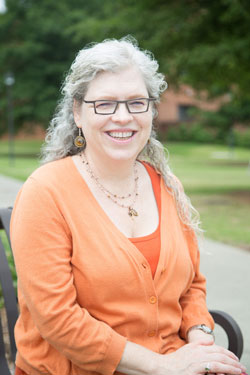 Today, Bach is an English professor at the UAB College of Arts and Sciences who captivates her students and colleagues with her command of 16th and 17th century literature. She has been named the recipient of the 2011 Ireland Award for Scholarly Distinction.
Today, Bach is an English professor at the UAB College of Arts and Sciences who captivates her students and colleagues with her command of 16th and 17th century literature. She has been named the recipient of the 2011 Ireland Award for Scholarly Distinction.“I was very surprised,” Bach said. “There are so many wonderful professors here; to be chosen is an honor.”
UAB presents the award annually to a full-time faculty member in the College of Arts and Sciences for professional and academic achievements and contributions to the university and local community. The prize, made possible by the Caroline P. and Charles W. Ireland Endowment for Scholarly Distinction, comes with $5,000 cash and a Steuben crystal engraved award.
“Dr. Bach offers a picture of the ideal scholar/teacher,” says her colleague Alison Chapman. “She is a deeply engaged writer and thinker, and this commitment to her research animates her teaching.”
In Bach’s classroom, students sit in a semi-circle because “I like to foster conversation,” she said. “I love getting my students to fall in love with Shakespeare.”
Bach goes beyond the much-taught surface lessons on characters and context. She explores the provocative topics bubbling beneath the lines of iambic pentameter such as sexuality and race. She has penned many articles addressing these issues and been published in some of the top journals in her field including ELH, Textual Practice and Renaissance Drama, sparking conversations in classrooms and among colleagues across the country.
Bach said she went to college with plans of being a scientist, and then she met Phyllis Rackin, a professor who taught Shakespeare like an artisan. Bach was enamored with Shakespeare’s plays, and her professional destiny became entwined with the wordsmith’s. While plotting her career path, Bach at first wondered if there was anything new she could teach about Shakespeare. Then, she read the 18th and 19th century adaptations of his works and noticed how editors scoured them of the author’s original use of sexuality.
“That fascinated me,” she said and began looking at the difference between Shakespeare’s use of sexuality and the treatment of it today. That has shaped her lesson plans and writings. In 2007, Bach wrote the book Shakespeare and Renaissance Literature Before Homosexuality.
This past year, she co-edited a collection of essays in homage to her college professor called Feminisms and Early Modern Texts: Essays for Phyllis Rackin. Now Bach is working on a book that explores animals in Shakespeare’s texts.
Bach’s inventive teaching methods and topics have resonated with students, her admirers say. She gets letters and emails from those who say she opened up new ways of thinking and learning for them.
When Bach thinks that she is in some way following in the footsteps of Rackin, her college professor, she smiles. “I would like to think so,” she said. “That would be wonderful.”
By Marie Sutton


